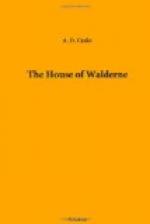Established only at the beginning of the century of our tale, it had already extended its energies throughout Europe. They came to England in 1224, only four clergy and five laymen. Already they numbered more than twelve hundred brethren in England alone; and they were found where they were most needed, in the back slums of the undrained and crowded towns, amongst the hovels of the serfs where plague was raging, where leprosy lingered—there were the Franciscans in this the heroic age of their order, before they had fallen from their first love, and verified the proverb—Corruptio optimi est pessima. Under their teaching a new school of theology had arisen at Oxford; the great Bishop of Lincoln, Robert Grosseteste, was its first lecturer, the most enlightened prelate of the day; and now Adam de Maresco, a warm friend of Earl Simon, was at its head. To his care the earl determined to commend young Martin.
Chapter 5: Martin Leaves Kenilworth.
Martin was henceforth relieved of his customary exercises in the tilt yard and elsewhere, which had become distasteful to him in proportion as the longing for a better life had grown upon his imagination. Of course the other boys treated him with huge contempt; and sent him metaphorically “to Coventry,” the actual spires of which august medieval city, far more beautiful then than now, rose beyond the trees in the park.
But the chaplain saw this, and with the earl’s permission lodged the neophyte in a chamber adjacent to his own “cell,” where he gave himself up to his beloved books, only varying the monotony by an occasional stroll with his friend Hubert, who never turned his back upon his former friend, and endured much chaffing and teasing in consequence.
Most rapidly Martin’s facile brain acquired the learning of the day—Latin became as his mother tongue, for it was then taught conversationally, and the chaplain seldom or never spoke to him in any other language.
And after a few months his zealous tutor thought him prepared for the important step in his life, and wrote to the great master of scholastic philosophy already mentioned, Adam de Maresco, to bespeak admission into one of the Franciscan schools or colleges then existing at Oxford. There was no penny or other post—a special messenger had to be sent.
The answer came in due course, and at the beginning of the Easter term Martin was told to prepare for his journey to the University. He was not then more than fifteen, but that was a common age for matriculation in those days.




